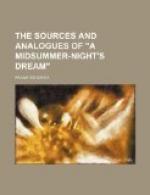When e’er you hear my piper blow,
From thy bed see that thou go;
For nightly you must with us dance,
When we in circles round do prance.
I love thee, son, and by the hand
I carry thee to Fairy Land,
Where thou shalt see what no man knows:
Such love thee King Obreon owes.
So marched they in good manner (with their piper before) to the Fairy Land: there did King Obreon show Robin Good-fellow many secrets, which he never did open to the world.
HOW ROBIN GOOD-FELLOW WAS WONT TO WALK IN THE NIGHT
Robin Good-fellow would many times walk in the night with a broom on his shoulder, and cry “chimney sweep,” but when any one did call him, then would he run away laughing ho, ho, hoh! Sometimes he would counterfeit a beggar, begging very pitifully, but when they came to give him an alms, he would run away, laughing as his manner was. Sometimes would he knock at men’s doors, and when the servants came, he would blow out the candle, if they were men; but if they were women, he would not only put out their light, but kiss them full sweetly, and then go away as his fashion was, ho, ho, hoh! Oftentimes would he sing at a door like a singing man, and when they did come to give him his reward, he would turn his back and laugh. In these humours of his he had many pretty songs, which I will sing as perfect as I can. For his chimney-sweeper’s humours he had these songs: the first is to the tune of I have been a fiddler these fifteen years.
Black I am from head to foot,
And all doth come by chimney soot:
Then maidens, come and cherish him
That makes your chimneys neat and trim.
Horns have I store, but all at my back;
My head no ornament doth lack:
I give my horns to other men,
And ne’er require them again.
Then come away, you wanton wives,
That love your pleasures as your lives:
To each good woman I’ll give two,
Or more, if she think them too few.
Then would he change his note and sing this following, to the tune of What care I how fair she be?[13]
Be she blacker than the stock,
If that thou wilt make her
fair,
Put her in a cambric smock,
Buy her paint and flaxen hair.
One your carrier brings to town
Will put down your city-bred;
Put her on a broker’s gown,
That will sell her maiden-head.
Comes your Spaniard, proud in mind,
He’ll have the first
cut, or else none:
The meek Italian comes behind,
And your Frenchman picks the
bone.
Still she trades with Dutch and Scot,
Irish, and the German tall,
Till she gets the thing you wot;
Then her end’s an hospital.
A song to the tune of The Spanish Pavin[14].
When Virtue was a country maid,
And had no skill to set up trade,
She came up with a carrier’s jade,
And lay at rack and manger.
She whiffed her pipe, she drunk her can,
The pot was ne’er out of her span;
She married a tobacco man,
A stranger, a stranger.




